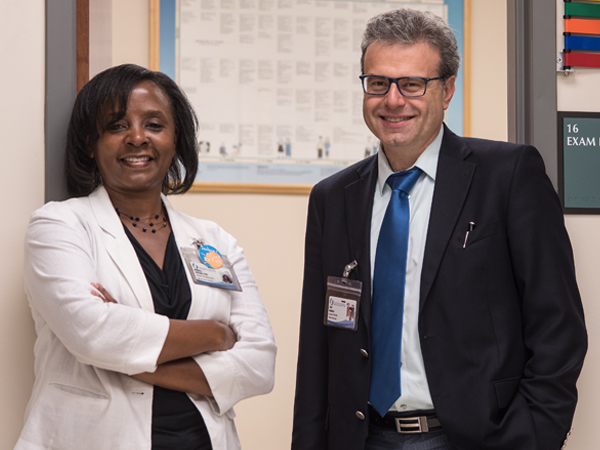Psychologist, neurologist offer state’s only multidisciplinary Tourette’s clinic

Parents of children who have Tourette's Syndrome may have gone the route of choosing between seeing a pediatric neurologist or seeking behavioral therapy through a child psychologist. Now there is a clinic at UMMC's Center for the Advancement of Youth, or CAY, that combines the two practices.
Dr. Monica Sutton, a clinical psychologist and associate professor of child psychology, began seeing patients with Tourette's and tics in November, offering strategies for dealing with tics, but pediatric neurologist Dr. Tarif Bakdash, associate professor of pediatric neurology, was also seeing patients with those conditions. Each offered the insights of their expertise, but both knew patients could benefit from psychology as well as neurology.
“I was referring so many patients to him, and he was referring so many patients to me, that we decided to offer a clinic together,” Sutton said. The clinic, started in March, is available on Thursdays at CAY, located on the first floor of Select Specialty Hospital, 5903 Ridgewood Road in Jackson.
“This is the only Tourette's clinic available in Mississippi,” said Bakdash, noting that the partnership with Sutton will provide care for Tourette's as well as comorbidities including Obsessive-Compulsive Disorder, Attention Deficit Hyperactivity Disorder, mood disorders and non-OCD anxiety disorders.
Tourette's is defined as having at least two motor tics and one vocal tic for at least a year. “It could be clearing the throat over and over,” said Sutton. “We have some who hum and some who curse involuntarily.”
According to the National Institutes of Health, about 200,000 Americans have the most severe form of Tourette's, but as many as one out of 100 have milder symptoms. Often the tics become worse in times of anxiety or excitement and better during calm, focused activities.
The cause of tics, said Bakdash, is a deficit in a brain circuit that connects deeper parts of the brain, basal ganglia and the thalamus, to the front of the brain.
Managing tics requires, in general, the cooperation of a pediatric neurologist and a child psychologist, Bakdash said, but most cases only need behavioral therapy.
Persistent throat clearing, sudden movements or sounds, blinking or even shouting out words they don't intend to say can be a heavy weight for children with Tourette's and other tic-related disorders. It can get them unwanted attention and stares in public as well as difficulty in the classroom.
Not coincidentally, Tourette's is often diagnosed when a child starts school at about 6, Sutton said. “They often have trouble in school and have problems with their peers. Sometimes they are made fun of by classmates or are punished for disruptions in class.”
Said Bakdash: “About 50 percent of children with Tourette's are bullied.”
Patients and families of the new clinic can learn about where in the brain tics originate, medicines, if needed, that may help and behavioral strategies. “Sometimes,” said Sutton, “we determine that the tics are severe enough that medical and behavioral therapies are warranted.”
Behavioral therapies, or Cognitive Behavioral Intervention for Tics, are taught in an eight-week program for patients and their families. During weekly visits, patients learn to become aware of their tics, the cues that might trigger them and situations that might make their tics worse.
One strategy, Sutton said, is to teach patients competing responses that can counter tics. “For example, if a patient's tic is coughing, we teach them to breathe in through the mouth and out through the nose,” Sutton said. “You can't do that and cough.”
“We have to have the parents' buy-in,” Sutton said. “They are the ones who will monitor the child and help implement the CBIT strategies. Parental involvement is critical for CBIT to work.”
Sutton also counsels patients and their families on how to deal with some of the collateral damage of Tourette's, self esteem wounded by teasing from peers.
“By the time they get to me,” Sutton said, “they can feel defeated."
Sutton encourages parents to consult the clinic if tics are impairing their children's daily functions. “They should seek treatment if their children are being bullied in school, are distracting others in the classroom or can't participate in activities such as playing sports or going to church because of their tics.”
Some patients also suffer from learning disorders or anxiety, Sutton said, and those conditions are treated first, so they can then focus better on CBIT strategies later on.
Bakdash said that, in some cases, psychiatric medications can be used to treat Tourette's, but a two-pronged approach of CBIT and medication can often be more effective than medication alone.
About a third of Tourette's patients outgrow their tics, said Bakdash, and another third see improvement as they become adults. “About 30 percent of patients continue to have Tourette's symptoms from childhood during their adult years.”
“We don't want to give parents false hope,” Sutton said, “but in many cases, we see a significant decrease in tics, and as children grow up, some tics may go away. The reality is, though, that they can come back, but if they do, the patient will have the tools to control the tics again.”


